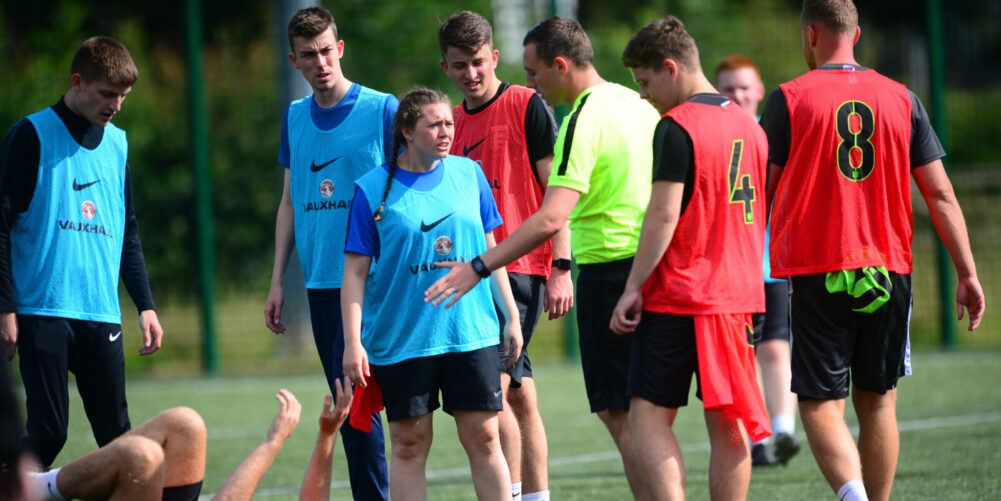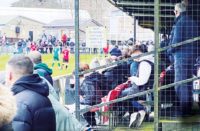AS part of The NLP's regular series with The Football Association, we sat down with National Referee Development Manager Daniel Meeson, Senior Referee Manager Peter Elseworth and former Stevenage player turned official Farai Hallam, who is also Senior Referee Officer at the governing body.
In the first of two parts, we discuss the standards, progressing through the system and changing the culture of refereeing.
NLP: We all know football can't function without referees, but how many are there?
PE: We have 28,000 active referees – all with different motivations and different levels of commitment. We've got to tailor the systems to make sure it is accessible for everyone and make sure anyone who wants to be involved in refereeing can achieve what they want to achieve. At the same time, making sure the game is serviced to a suitable standard.
We have around 4,000 people at any given point who are going through the course and learning to become a referee. We've made quite significant gains in the last 12 months in converting a greater proportion of those from just doing the training course and never refereeing a football match, to actually refereeing. Which, last year, saw an increase in the number of referees for the first time in two or three years.
The other aspect is the number of referees who re-registered. It used to be 76 per cent – last season it went up to 79 per cent. The general feeling is the referee numbers are going down. Actually, they're not.
In my view, we're at the start of something where we can see great strides in improving the overall number of referees but also the standard of
referees.
NLP: Do you think people forget every referee starts in the same place?
PE: To get to the top is a linear world. Even if you are the most outstanding referee that has ever entered the game, the quickest you can do it is ten years. One of the things we need to look at is how we improve our structures to ensure you can expose referees to the right amount of experience to prepare them for working through the system, in a shorter period of time.
DM: It's an ever increasing demand on all of us – as individuals and a team – to bring younger referees through quicker so we can service the game at the elite levels for longer periods of time.
But I would also say that perhaps some of the success of English referees at the very top level of the game is testimony to the years of experience they've built up in refereeing from The Red Lion v The Dog & Duck on a Sunday morning. Howard Webb said it took him 19 years from refereeing his first game to the World Cup final in South Africa in 2010. In those 19 years, there's not a great deal football won't have thrown at him.
You have to balance it very carefully – while there is a thought process of having a faster track to get them through the system quicker, there's that balance of not compromising the quality of experience that gets them through.
FH: We're fortunate in England to have such a strong football Pyramid. You go to other countries – tier one, two three, then a huge drop off. So you can actually get to a good level quite quickly but you've not actually had much experience. Here in England, if you're refereeing in the Isthmian Premier, it's not easy – you could be in front of 1,000 people. In other countries, that is the second division. That prepares our referees when they get to the top.
PE: Expediting their learning should not be at the cost of the experience you need to be able to referee at, for example, the Isthmian League. To get to refereeing at Step 3, you have been good. You are already in the top two per cent of referees in the country to get to that level and you have shown dedication, commitment and passion for it.
FH: It's amazing. You can first meet someone at 16 and by the time they are 23, they're a different person. They're far more mature and have developed at a far greater rate than they would have if they weren't refereeing. I think it's lost what refereeing can do for an individual – self-discipline, presentation, man-management. All things that are transferable in all walks of life.
DM: We're working alongside the Twinning Project who are in partnership with HMP to roll out referee education and courses in prisons – it's about giving people that second chance in life. When you talk about those skills Farai just mentioned – time keeping, looking after your body, good nutrition, resolving conflict, good administration skills – so many things refereeing can give you other than just being able to referee a football match.
NLP: The invite to the pre-season training camp for Step 2 refs gave us a fascinating insight into the work being done behind the scenes – it also showed the togetherness of all the referees.
DM: The bottom line is they are all in competition because we can't promote 50 referees at the end of the season to the next level. It is a dog-eat-dog world but you can still have that togetherness in a learning environment. When I look at the faces in that room I see it as a squad. Some will take the step to the next level come May next year – not all of them – but that probably wasn't a culture that existed three years ago. We've worked hard collectively as a department to forge that.
Now, and I genuinely believe it, people look forward to those training opportunities. They want to learn and progress because at the elite level of the game for those aspiring to come through, there's never been a better time to be a referee. I'm not just talking about financial rewards. I'm talking about life experiences, sense of fulfilment, being part of the professional game domestically and internationally.
NLP: There's a perception the standard of refereeing is going down. Is that fair?
PE: The standard of referee has gone up year-on-year over the last seven years. We changed our structures to say, right, we're going to get you out refereeing every week rather than running the line one week, refereeing the next, and halving your time and dedication on each skillset.
So focus on refereeing or focus on assistant refereeing and be as good as you possibly can be. For committing to doing that we will give you four meetings over a season, you will have access to sports scientists, nutritionists, sports psychologists, we're going to give you targets for body fat. All of that support network that exists at the top of our Non-League game is providing referees to the Football League now that, if we compare to ten years ago, are prepared for the professional game.
At the same time, that improves the overall standard of refereeing in the Non-League game. The standard at Step 2 last year is the best it has been according to both data sets – the clubs and the independent observers.
Take the actual performance of Step 3 and 4 referees, and this belief that clubs don't think they are very good, if we look at the data sent in, there are two-thirds more marks that are high (90 and above) given by clubs than there are low (60 and below).
FH: Referees will have bad days. Like with a team at the top of the league who has a bad day. It doesn't mean they're not still the best team in the league.
Some referees will go up and the level is not for them. As with a team, they will come back down. Referees are good but why would you hear about it?
PE: Howard Webb says we want referees to be anonymously competent. That sums it up. We don't want referees lauded at the end of the game. That's not what they're there for, they're there to manage a football match.
NLP: Does it concern you that once someone, a manager for example, makes a public statement about a referee, it's taken as fact?
DM: Working with those managers that can often be the mouthpiece of the standard of refereeing in the Non-League Pyramid is a challenge. We give the National League, North and South managers the opportunity every season to sit down and talk to us. We say, ‘Look there will be decisions this season you disagree with. But a plea from us. Don't throw a blanket over everything by way of standard based on one decision or one performance. Or even a couple of performances'.
PE: If we go back in time there was an Us and Them attitude – that we will protect the referee no matter what. That's not the case. Farai has been central to that with our club feedback process that we brought in two or three years ago where, if a club has comments about a performance, we will say, ‘Come and talk to us'. If we think the referee is right, we will say. If he is completely wrong we will utilise that experience to make sure that referee doesn't make that mistake again.
DM: I had a conversation with two National League managers who have been at a higher level and managed in the Football League and they said, ‘The one thing we see from referees now is there is a hunger. They are trying to get to the top so we know they will make mistakes but we get that they care'.
Previously, prior to a strategic restructure, National League North and South would have referees who, actually, that was them. That was their career, kind of thing. They'd operate at that level for the foreseeable. So some would go out as if to say, ‘I'll perform as I can, I've got no desire to go up, I'm happy here'.
We haven't got that now. All the referees, bar none, The NLP saw at the Level 2B training camp want to succeed and go further. They want to get to the next level and the level after that. Five or six years ago, we didn't have that culture. We had people who were happy there, still running the line on the Football League. Then complacency sets in, there's a lack of desire to receive feedback etc.
It has taken us a few years to break that up.
FH: Referees in the National League System want to progress – it matters to them whether they get things right or wrong. There's a consequence to that. Three or four days before, they will be preparing for a game on a Saturday. For two or three days after they will be analysing.
When I came into refereeing from playing, I didn't ever think it would be competitive. But it is. Fixtures will come out and, especially towards the end of the season, you want to be refereeing the biggest games.
PE: Referees are reclassified at the end of the season. If they are consistently underperforming, at the end of the season you will be reclassified down a level. There are consequences to being consistently poor the same as there are consequences to being consistently good. I don't think that's known enough.
























